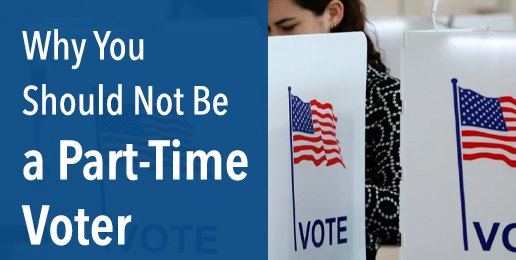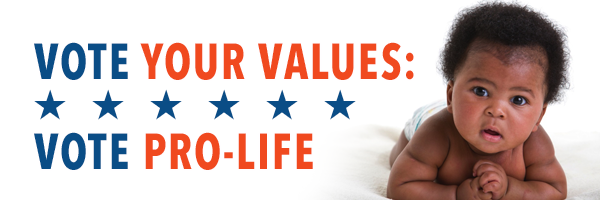
Pew Research recently published a report of U.S. voter turnout, observing that the last three national elections (’18, ’20, and ’22) displayed some of the highest turnout of the century.
Yet, even with historic multitudes coming to the ballot-box, Pew’s numbers show that only about a third of Americans (37%) voted in all three of those elections. About another third (30%) did not vote in any of the three, and the last third (33%) voted in at least one but not all.
In other words, at the same time we were experiencing historically high numbers of voting, still only a third of Americans found it worth their while to consistently submit their ballot. Let’s call them the “full-time voters”—those who dedicated a handful of hours per election year to the process of determining the future of the country.
Three cheers for them.
However, only one in three of us is a full-time voter. This means that the real “election-determining” voters (the ones whose presence will often swing an election one way or another) are the “part-timers.” They might not always care about this year’s candidates, they might have forgotten about election day last November, or there might have been other reasons why voting has not been a full-time gig for them.
Nevertheless, as Pew puts it, they hold quite a bit of power when they decide to clock in.
Pew’s analysis:
“While sizable shares of the public vote either consistently or not at all, many people vote intermittently. Given how closely divided the U.S. is politically, these intermittent voters often determine the outcome of elections and how the balance of support for the two major political parties swings between elections.“
Ironically, because there are so many people who don’t vote consistently, the inconsistent voters significantly swing the elections when they decide to show up. This is true of either political party. Pew concludes,
“Given the sizable number of intermittent voters and chronic nonvoters, as well as the fact that this group, collectively, is fairly evenly divided in partisan affiliation, both parties have plenty of potential supporters on the sidelines in any given election.”
Therefore, if you are interested in seeing the world change for the better on a political level, here’s one thing you should also be interested in: part-time voters leveling up to full-time status. And if you are a part-time voter yourself, this message is particularly for you.
Yes, this is indeed the customary pre-election pep-talk on voting, and knowing the readership of IFI, I may very well be preaching to the choir. But maybe then the choir will turn around and preach to the pews.
Let’s first discuss one common reason not to vote. Full disclosure: I’ve been guilty of this kind of fatalistic apathy in the past too, so as I write this, I’m repenting myself. But at least I know what it feels like to have thought this:
“One vote doesn’t make a difference! Why should I bother researching candidates, filling out my ballot, driving to the drop box, etc.? Literally nothing will change if I decide not to vote this time around.”
Here’s the problem with this: If everyone thought like you did, no one would vote. More specifically, if everyone with biblical common sense thought like you did, there would be no more biblical common sense in any elections. That doesn’t sound like a recipe for a God-honoring world.
Think about it this way: Saying “one vote never makes a difference anyway, so I won’t vote” confuses the importance of your individual vote with the importance of individual votes in general. Yes, your individual vote will not affect the election. But every individual vote, taken all together, will certainly do so.
Just ask yourself: Would you be happy if every other Christian in the nation believed what you’re believing right now? If not, then is this excuse only true for you for some reason? I’d be hard-pressed to think of a reason why you would be exempt from what you’d want all other Christians to be doing.
In Deuteronomy 31:6, Moses told the people of Israel as a whole to be strong and courageous. But what if a single Israelite man in the army had decided to be cowardly and not fight well? “One soldier never makes a difference anyway, so I just won’t fight.”
After all, the upcoming battles with the Canaanites would likely have turned out just the same. But that did not give any particular Israelite man an excuse to be cowardly, because if every Israelite soldier had believed this philosophy, there would have been no army at all.
Ultimately, group obligations produce individual obligations. As a group, the body of Christ has an obligation to fight for truth. Therefore, as individuals, Christians have an obligation to vote.
Just like individual soldiers, individual votes matter. Which means your choice to vote matters as well. Please don’t be a part-time voter.























